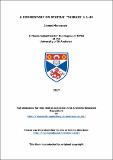Files in this item
A commentary on Statius' 'Thebaid' 1.1-45
Item metadata
| dc.contributor.author | Manasseh, James | |
| dc.coverage.spatial | 90 leaves | en_US |
| dc.date.accessioned | 2017-08-02T13:54:31Z | |
| dc.date.available | 2017-08-02T13:54:31Z | |
| dc.date.issued | 2017 | |
| dc.identifier.uri | https://hdl.handle.net/10023/11354 | |
| dc.description.abstract | This dissertation discusses the proem of Statius’ Thebaid (1.1-45) and the analysis of the text is split between an introduction, three extended chapters and a lemmatized commentary. Statius’ acknowledgements of his literary debts, in particular Virgil, encourages, if not demands, an intertextual reading of his poetry. As such, my first chapter, Literary Models, looks at how Statius engages with his epic models, namely Homer, Virgil, Lucan and Ovid, but also how he draws upon the rich literary Theban tradition. Like all Roman poets, Statius is highly self-conscious of his craft, and draws upon Hellenistic and lyric models to enrich his epic and define himself as an exemplary poet. I will argue that the proem offers a useful lens for analysing the Thebaid and introduces his epic in exemplary fashion, in the sense that he draws attention to the concept of opening his epic with the use of traditional tropes (namely, the invocation of inspiring force; a recusatio; an imperial encomium and a synopsis of the poem’s narrative). Considering the importance of origins in the Thebaid, and the inability to escape them, I consider the proem, in this sense, the origin of the poem itself insofar as elements of it are constantly ‘remembered’ and reiterated throughout the poem. The central feature of the proem is the encomium to Domitian, in which Statius advises Domitian to realize his own limits and hence retain order of the world he rules over, articulating contemporary concerns about succession and empire. Statius, in a similar manner, expresses intent to impose limits upon his own poem, which prompted me to write the chapter entitled Restraint. The third chapter, Characterisation, draws upon the discussions in Literary Models and Restraint in an analysis of the heroes introduced at 1.41-45. | en_US |
| dc.language.iso | en | en_US |
| dc.subject.lcc | PA6697.A43M2 | |
| dc.subject.lcsh | Statius, P. Papinius (Publius Papinius). Thebais. Liber 1. | en |
| dc.title | A commentary on Statius' 'Thebaid' 1.1-45 | en_US |
| dc.type | Thesis | en_US |
| dc.type.qualificationlevel | Doctoral | en_US |
| dc.type.qualificationname | MPhil Master of Philosophy | en_US |
| dc.publisher.institution | The University of St Andrews | en_US |
This item appears in the following Collection(s)
Items in the St Andrews Research Repository are protected by copyright, with all rights reserved, unless otherwise indicated.

